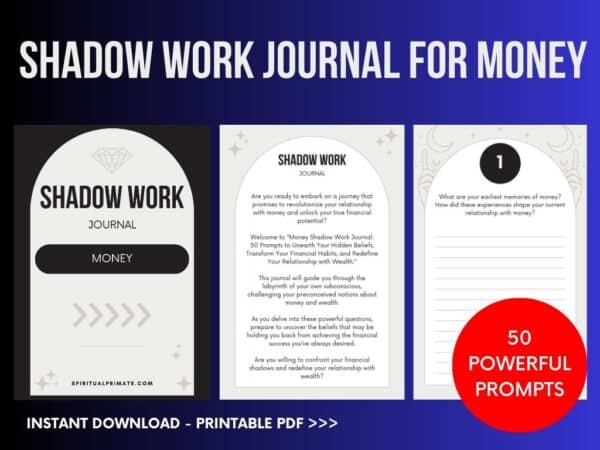Are you ready to embark on a journey that promises to revolutionize your relationship with money and unlock your true financial potential? Welcome to “50 Profound Money Shadow Work Prompts: Unearth Your Hidden Beliefs, Transform Your Financial Habits, and Redefine Your Relationship with Wealth.”
This collection of thought-provoking prompts will guide you through the labyrinth of your own subconscious, challenging your preconceived notions about money and wealth. As you delve into these powerful questions, prepare to uncover the beliefs that may be holding you back from achieving the financial success you’ve always desired.
Are you willing to confront your financial shadows and redefine your relationship with wealth?

Transform Your Relationship with Money
Many people struggle with their relationship with money, often experiencing stress and anxiety when it comes to finances. However, by changing your mindset and adopting healthy financial habits, you can unlock your true financial potential and achieve financial freedom.
Understand Your Money Story
The first step to changing your relationship with money is to understand your money story. This involves examining your beliefs, attitudes, and experiences around money that have been shaped by your upbringing, environment, and personal experiences. Reflect on the following questions:
- What beliefs and attitudes about money were you taught as a child?
- How have your past financial experiences impacted your current relationship with money?
- Are there any negative emotions or beliefs you associate with money?
By understanding your money story, you can identify the areas that need improvement and begin to work on them.
Set Clear Financial Goals
To unlock your financial potential, it’s essential to have clear and specific financial goals. These goals should be SMART (Specific, Measurable, Achievable, Relevant, and Time-bound). Having well-defined goals will help you stay focused and motivated on your financial journey. Examples of financial goals include:
- Saving for an emergency fund
- Paying off high-interest debt
- Saving for a down payment on a house
- Investing for retirement
Create a Realistic Budget
A budget is a plan that outlines your income and expenses, helping you manage your money effectively. To create a realistic budget, follow these steps:
- List your monthly income sources, including salary, freelance work, investments, etc.
- List your monthly expenses, such as rent/mortgage, utilities, groceries, transportation, etc.
- Allocate a specific amount to each expense category, prioritizing essential expenses first.
- Track your spending to ensure you’re sticking to your budget and adjust as needed.
Develop Healthy Financial Habits
To change your relationship with money, it’s crucial to develop healthy financial habits. Some habits to consider include:
- Regularly reviewing your financial goals and progress
- Saving a portion of your income before spending on discretionary items
- Avoiding impulse purchases and practicing delayed gratification
- Building an emergency fund to cover unexpected expenses
- Seeking professional financial advice when needed
Focus on Financial Education
Continuously learning about personal finance can help you make informed decisions and improve your relationship with money. Some ways to boost your financial education include:
- Reading personal finance books and articles
- Listening to finance podcasts
- Attending financial workshops or seminars
- Joining online finance communities or forums
Practice Gratitude and Mindfulness
Being grateful for what you already have can help you develop a healthier relationship with money. Practice gratitude by acknowledging the abundance in your life and expressing appreciation for your financial blessings. Additionally, mindfulness can help you become more aware of your financial habits and emotions, allowing you to make conscious choices that align with your goals.
Transforming your relationship with money is a journey that requires self-awareness, discipline, and continuous learning. By understanding your money story, setting clear financial goals, creating a realistic budget, developing healthy financial habits, focusing on financial education, and practicing gratitude and mindfulness, you can unlock your true financial potential. Embrace the journey and enjoy the benefits of financial freedom and peace of mind.

The Connection Between Shadow Work and Financial Well-being
Shadow work is a psychological concept that focuses on identifying, understanding, and integrating the darker aspects of one’s personality. It is a process of self-discovery and self-acceptance, which can lead to personal growth and emotional healing. But can shadow work have an impact on one’s financial well-being?
Understanding Shadow Work and Money
The term “shadow” in psychology refers to the repressed or hidden aspects of our personality that we do not consciously acknowledge. These can include fears, insecurities, traumas, and negative beliefs about ourselves. When it comes to money, our financial shadows may include feelings of guilt, shame, inadequacy, or fear of success or failure.
Shadow work involves bringing these hidden aspects into the light, understanding their origins, and integrating them into our conscious awareness. By doing so, we can begin to release the limiting beliefs and emotional baggage that may be holding us back financially.
The Benefits of Shadow Work on Financial Well-being
1. Improved Money Mindset: By addressing our financial shadows, we can develop a healthier and more balanced relationship with money. This includes recognizing and challenging negative beliefs about wealth, success, and our worthiness to receive abundance. With a more positive money mindset, we are more likely to attract financial opportunities and make better financial decisions.
2. Increased Financial Awareness: Shadow work encourages us to examine our financial habits and patterns, helping us to become more conscious of our spending, saving, and investing behaviors. This increased awareness can lead to more intentional and mindful financial choices that support our long-term financial goals.
3. Enhanced Emotional Resilience: As we face and integrate our financial shadows, we develop greater emotional resilience. This resilience can help us navigate the ups and downs of our financial journeys with more grace and confidence, ultimately leading to improved financial stability.
4. Strengthened Relationships: Money is often a source of tension and conflict in relationships. By addressing our financial shadows, we can foster healthier communication and understanding around money with our partners, family members, and friends. This can lead to more supportive and harmonious financial dynamics in our relationships.
5. Greater Personal Growth: Shadow work invites us to confront and overcome our financial fears and insecurities, leading to personal growth and self-improvement. As we evolve and grow as individuals, we are more likely to experience financial success and abundance.
Shadow work can have a profound impact on our financial well-being by helping us to address the hidden aspects of our relationship with money. Through this process of self-discovery and integration, we can develop a healthier money mindset, increase our financial awareness, enhance our emotional resilience, strengthen our relationships, and ultimately experience greater financial success. By engaging in shadow work, we can transform our financial shadows into sources of strength and abundance. How will you use this knowledge to improve your financial well-being?

Money Shadow Work Prompts
1. What are your earliest memories of money? How did these experiences shape your current relationship with money?
2. How do you define financial success? Is your definition based on societal expectations or your own personal values?
3. In what ways has your family’s financial background influenced your beliefs about money? How do these beliefs affect your current financial situation?
4. What role does money play in your self-worth? Are you using financial success as a way to validate your worthiness?
5. What are your financial fears? How do these fears hold you back from achieving your goals?
6. How does the concept of abundance and scarcity play out in your life? How do these mindsets impact your relationship with money?
7. How do you feel when you spend money on yourself? Are you comfortable treating yourself, or do you feel guilty?
8. What are your financial goals? Are they aligned with your values and passions?
9. How do you react when others achieve financial success? Are you genuinely happy for them, or do you feel jealous and resentful?
10. What limiting beliefs do you hold about money? How can you challenge these beliefs and create a healthier relationship with money?
11. How do you handle financial stress? What coping mechanisms do you use to manage your financial anxiety?
12. What financial mistakes have you made in the past? How can you learn from these experiences and make better decisions moving forward?
13. Do you feel deserving of financial abundance? Why or why not?
14. How do you define financial freedom? What steps can you take to achieve this sense of freedom in your life?
15. What emotions come up for you when you think about money? Are these emotions serving you or holding you back?
16. How does your current job or career align with your financial goals and values? Are you happy with your current income and work-life balance?
17. How do you prioritize spending money? Are you investing in things that truly bring you joy and fulfillment, or are you just trying to keep up with others?
18. Do you feel guilty when you spend money on things that are not necessities? How can you reframe this mindset and allow yourself to enjoy your hard-earned money?
19. What financial habits would you like to cultivate in order to create a more stable and secure future?
20. How do you view debt? Are you taking steps to pay off any debt you have, or are you ignoring it and hoping it will go away?
21. How has your relationship with money affected your relationships with others? Do you feel comfortable discussing finances with loved ones, or does it create tension and discomfort?
22. Do you believe that money can buy happiness? Why or why not?
23. How do you handle unexpected financial expenses or emergencies? Are you prepared for these situations, or do they throw you off balance?
24. How do you feel about receiving money from others, such as gifts or inheritances? Are you able to receive it with gratitude, or does it create feelings of guilt or obligation?
25. Do you feel that money has the power to control your life? How can you regain control and create a healthy balance between money and other aspects of your life?
26. How does your spending reflect your values and priorities? Are you investing in things that truly matter to you, or are you just spending money to fill a void?
27. What financial responsibilities do you have that you may be avoiding or neglecting? How can you take steps to address these responsibilities and move forward?
28. What beliefs do you hold about people who are wealthy or financially successful? Are these beliefs serving you or limiting your own potential for success?
29. How does your relationship with money affect your physical and mental health? Are you experiencing stress, anxiety, or other negative emotions due to financial struggles?
30. How do you feel about seeking professional help, such as a financial advisor or therapist, to improve your relationship with money?
31. What financial lessons have you learned from past generations in your family? How can you break cycles of unhealthy financial behavior and create a better legacy for future generations?
32. How do you feel about giving money to others, such as charity or donating to a cause you believe in? Are you able to give with a generous heart, or does it create feelings of resentment or obligation?
33. How do you handle conflicts or disagreements with others around money? Are you able to communicate effectively and come to a resolution, or does it create tension and resentment?
34. What financial goals have you achieved in the past? How did you feel when you achieved these goals, and how can you use this motivation to achieve future goals?
35. How do you feel about taking risks with money, such as investing or starting a business? Are you comfortable with the potential for failure, or does it create anxiety and fear?
36. How does your relationship with money affect your personal and professional relationships? Are you able to set healthy boundaries and communicate effectively, or does it create conflict and tension?
37. How do you view money in relation to your spiritual or philosophical beliefs? Does your relationship with money align with your values and beliefs?
38. What financial habits or behaviors do you engage in that may be harmful or self-sabotaging? How can you break these patterns and create healthier habits?
39. How do you feel about the concept of “earning” money? Do you feel that you have to work hard to earn every penny, or are you open to receiving money in unexpected ways?
40. How does the concept of time play into your relationship with money? Are you comfortable with delayed gratification and long-term planning, or do you prioritize immediate satisfaction?
41. What financial sacrifices are you willing to make in order to achieve your goals? Are you willing to prioritize saving and investing over short-term pleasure?
42. How do you view money in relation to your identity and sense of self? Are you using money to define yourself, or are you able to separate your self-worth from your financial situation?
43. How do you handle feelings of envy or jealousy when it comes to others’ financial success? Are you able to celebrate their achievements, or does it create negative emotions for you?
44. What financial goals do you have for your future? Are you taking active steps to achieve these goals, or are you just hoping for the best?
45. How do you feel about investing in yourself, such as education or personal development? Are you willing to invest in yourself in order to achieve greater financial success?
46. What financial habits or patterns do you see repeating in your life? How can you break these patterns and create a more positive relationship with money?
47. How do you handle financial setbacks, such as losing a job or unexpected expenses? Are you able to bounce back and recover, or does it create long-term negative effects?
48. How do you feel about asking for help or support when it comes to money? Are you able to reach out to loved ones or professionals, or do you prefer to handle everything on your own?
49. How does your relationship with money affect your ability to enjoy life? Are you able to find joy and fulfillment outside of material possessions and financial success?
50. How can you use your financial situation to create positive change in your life and the world around you? Are you able to use money as a tool for good, or does it create negative effects in your life and the lives of others?
Congratulations on completing this transformative journey through the depths of your subconscious mind, exploring your financial shadows with these 50 profound money shadow work prompts.
By confronting your hidden beliefs and examining your financial habits, you’ve taken a crucial step towards reshaping your relationship with wealth. As you move forward, continue to challenge yourself and strive for growth in all aspects of your financial life.
Remember, the path to true financial freedom is an ongoing process that requires constant self-reflection, determination, and growth. So, are you ready to take the next step and unlock the door to your limitless financial potential?
Dive Deeper Into Your Shadow Work Journey
- Product on sale
 Printable Shadow Work Journal for Money [PDF]Original price was: $11.98.$5.99Current price is: $5.99.
Printable Shadow Work Journal for Money [PDF]Original price was: $11.98.$5.99Current price is: $5.99. - Product on sale
 50 Money Shadow Work Prompts | Printable PDFOriginal price was: $5.98.$2.99Current price is: $2.99.
50 Money Shadow Work Prompts | Printable PDFOriginal price was: $5.98.$2.99Current price is: $2.99.

